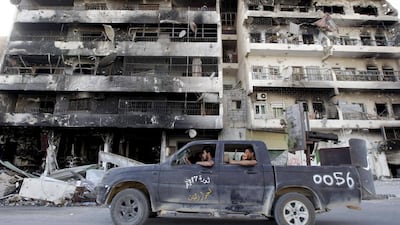Risk management in normal situations relates to economic or financial change. For companies entering politically unstable markets in the Middle East, the concept gets a little more complex.
Faced with ineffective governance, political interference, pervasive corruption, supply chain disruptions, uncertain tribal divisions, legal and regulatory inconsistencies and the threat of attack or kidnapping, doing business in some Middle East nations can take western managers deep into unknown territory.
In the Forbes 2013 list of the world’s riskiest countries in which to do business, six countries in this part of the world – Afghanistan, Syria, Iran, Iraq, Sudan and Yemen – were rated at the most extreme end of the scale. For the region’s countries coming out of political turmoil – Libya, Egypt, Algeria – the situation is not much better.
But for businesses that take a risk, and survive, the long-term rewards in this rapidly expanding market can be high.
Working in war zones and politically volatile markets requires flexibility, local knowledge and a great deal of patience, says Armand Phares, the chairman and managing director of Mercuphar Group, which markets pharmaceutical goods to Lebanon, Syria and Sudan.
Local partners – who know the region, the environment, the networks and the culture – are better able to avoid trouble and to navigate through bureaucratic minefields. They know which government regulations require immediate action and which tacit formalities must be followed.
“It’s a matter of arming yourself with as much knowledge about the situation as possible,” Mr Phares, an Insead graduate, said after a panel discussion on the region’s challenges at the 2013 Insead Global Business Leaders Conference in Abu Dhabi last month.
Businesses need to be able to determine when underlying tensions and conflicts might escalate to violent confrontations between groups or communities, and to ensure that their decisions do not make things worse.
“They need to be aware of what is coming, how to avoid risky quarters and at the same time maintain a presence,” Mr Phares says. “Millions of people survive in war conditions, there’s no reason companies cannot.”
In these conditions, businesses have to become creative in finding new ways to deliver goods and services to market and to manage a business in extreme and changing conditions.
“It’s very frustrating to be innovative in survival conditions – to innovate to maintain standards instead of innovating to improve quality and servicing,” Mr Phares notes. “But survival in these regions means you have to maintain the quality of your products and services and abide by the same good storage and distribution practices as if you were in a normal country.”
It is not easy and companies prepared to take the risk of moving to conflict areas should carefully assess their goals.
“You need a definite vision of where you want to go. Such a vision should definitely be orientated to long-term return because often in the short term [these volatile markets] are not a good place to be,” Mr Phares says.
After completing his MBA in the 1970s, Mr Phares returned to Lebanon during the civil war to take over the family pharmaceutical company.
“I didn’t go looking for a volatile situation. It wasn’t a choice to operate in a difficult region, but managing that volatility became a proficiency which we are now using to move into similar markets,” he says.
“The countries where we go are definitely countries where it is difficult to operate, where the potential has not yet been deployed, [because] in countries where it’s easy, nobody needs us.”
Companies also need to look for ways to help rebuild the potential new markets.
“Successful businesses are key to putting countries back together after war and contributing to socio-political stability. Both sides of any conflict know this,” Mr Phares says, noting that while there is always a risk of contracts being torn up when a new regime takes over, staying apolitical is relatively easy and the question of taking sides is rarely an issue.
Mercuphar Group works with governments in the countries in which it operates to introduce regulations that will assist in opening up distribution channels for its high-quality pharmaceuticals and limit the risk of parallel imports of fake or low-quality goods.
But government behaviour can be unpredictable. The United Nations Global Compact platform recommends businesses looking to operate in countries with new or unstable regimes back up their risk management with statements of values, regular monitoring and reporting, and initiatives that demonstrate commitment.
“Companies can act most effectively through partnerships or in coalition with NGOs and consortia of like-minded businesses,” it states. “The key is to create a level playing field within the private sector so companies that fight corruption are not displaced by less ethical competitors.”
Transparency is an important tool for making corruption more difficult.
“Transparency is not a choice, it really is a precondition to being active in the field and creating sustainable markets,” Mr Phares says.
The Middle East is an exciting and potentially profitable place to be. But businesses operating in areas of conflict need to tread carefully; mismanagement in conflict environments can threaten a company’s investment, damage its reputation and place its personnel and facilities at risk.
The important thing for companies is to sustain for as long as possible the same level of professionalism used in times of peace, Mr Phares says. “It’s very frustrating ... and highly exciting.”
Jane Williams is the editor of Knowledge Arabia at the Insead Business School, Abu Dhabi

